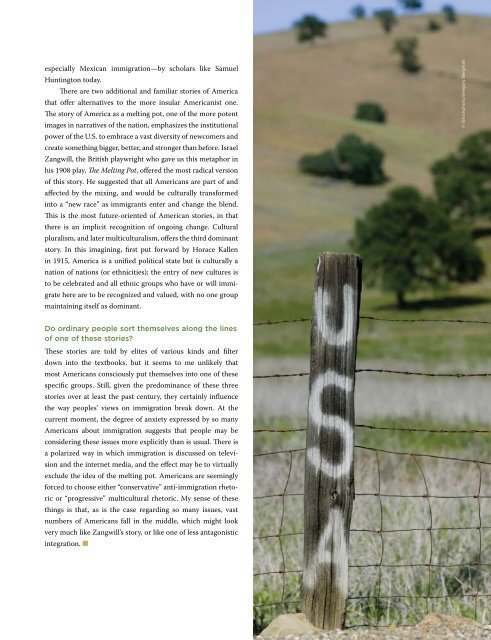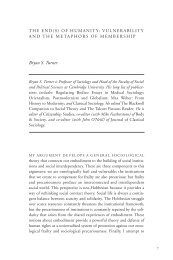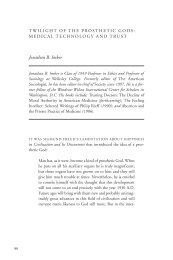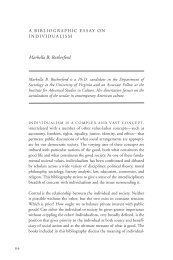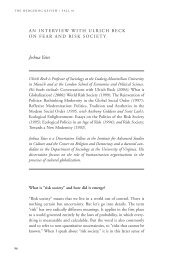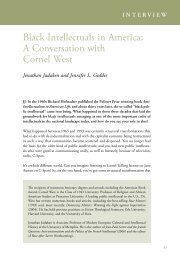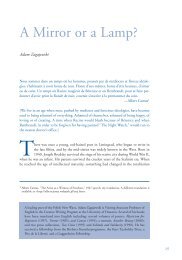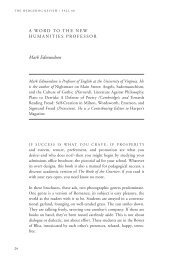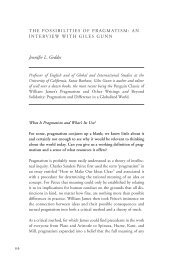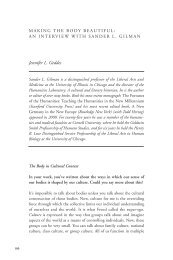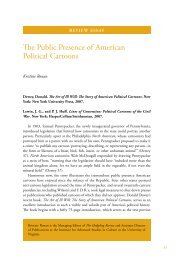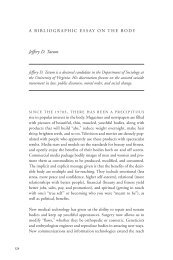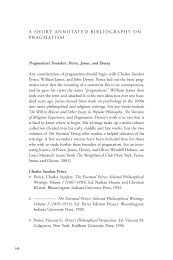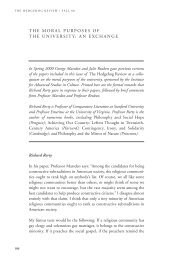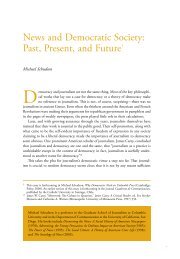ambiguous distinctions - Institute for Advanced Studies in Culture
ambiguous distinctions - Institute for Advanced Studies in Culture
ambiguous distinctions - Institute for Advanced Studies in Culture
Create successful ePaper yourself
Turn your PDF publications into a flip-book with our unique Google optimized e-Paper software.
especially Mexican immigration—by scholars like Samuel<br />
Hunt<strong>in</strong>gton today.<br />
There are two additional and familiar stories of America<br />
that offer alternatives to the more <strong>in</strong>sular Americanist one.<br />
The story of America as a melt<strong>in</strong>g pot, one of the more potent<br />
images <strong>in</strong> narratives of the nation, emphasizes the <strong>in</strong>stitutional<br />
power of the U.S. to embrace a vast diversity of newcomers and<br />
create someth<strong>in</strong>g bigger, better, and stronger than be<strong>for</strong>e. Israel<br />
Zangwill, the British playwright who gave us this metaphor <strong>in</strong><br />
his 1908 play, The Melt<strong>in</strong>g Pot, offered the most radical version<br />
of this story. He suggested that all Americans are part of and<br />
affected by the mix<strong>in</strong>g, and would be culturally trans<strong>for</strong>med<br />
<strong>in</strong>to a “new race” as immigrants enter and change the blend.<br />
This is the most future-oriented of American stories, <strong>in</strong> that<br />
there is an implicit recognition of ongo<strong>in</strong>g change. Cultural<br />
pluralism, and later multiculturalism, offers the third dom<strong>in</strong>ant<br />
story. In this imag<strong>in</strong><strong>in</strong>g, first put <strong>for</strong>ward by Horace Kallen<br />
<strong>in</strong> 1915, America is a unified political state but is culturally a<br />
nation of nations (or ethnicities); the entry of new cultures is<br />
to be celebrated and all ethnic groups who have or will immigrate<br />
here are to be recognized and valued, with no one group<br />
ma<strong>in</strong>ta<strong>in</strong><strong>in</strong>g itself as dom<strong>in</strong>ant.<br />
<br />
<br />
<br />
These stories are told by elites of various k<strong>in</strong>ds and filter<br />
down <strong>in</strong>to the textbooks, but it seems to me unlikely that<br />
most Americans consciously put themselves <strong>in</strong>to one of these<br />
specific groups. Still, given the predom<strong>in</strong>ance of these three<br />
stories over at least the past century, they certa<strong>in</strong>ly <strong>in</strong>fluence<br />
the way peoples’ views on immigration break down. At the<br />
current moment, the degree of anxiety expressed by so many<br />
Americans about immigration suggests that people may be<br />
consider<strong>in</strong>g these issues more explicitly than is usual. There is<br />
a polarized way <strong>in</strong> which immigration is discussed on television<br />
and the <strong>in</strong>ternet media, and the effect may be to virtually<br />
exclude the idea of the melt<strong>in</strong>g pot. Americans are seem<strong>in</strong>gly<br />
<strong>for</strong>ced to choose either “conservative” anti-immigration rhetoric<br />
or “progressive” multicultural rhetoric. My sense of these<br />
th<strong>in</strong>gs is that, as is the case regard<strong>in</strong>g so many issues, vast<br />
numbers of Americans fall <strong>in</strong> the middle, which might look<br />
very much like Zangwill’s story, or like one of less antagonistic<br />
<strong>in</strong>tegration.


